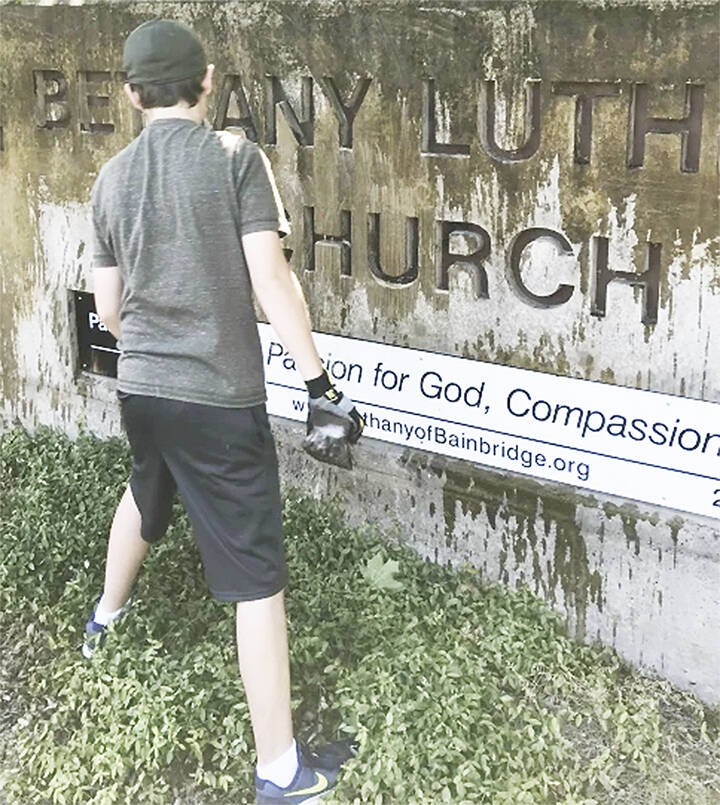It might take heavenly intervention for Bainbridge Island to come up with an affordable housing ordinance.
At the City Council meeting last week, it was told that after eight meetings the Planning Commission voted 3-3 on a recommendation. In response to new state law, it was tasked with coming up with a density bonus for affordable housing projects done by religious organizations.
Sarah Blossom, the commission’s chair, voted in favor of a recommendation, along with longtime members Bill Chester and Ashley Mathews. Lisa Macchio voted against it, along with newcomers Yesh Subramanian and Ariel Birtley.
“It’s a non-recommendation,” city manager Blair King said.
There was no discussion, but Councilmember Jon Quitslund asked that the issue be talked about soon. “We need to decide next steps,” he said. “This is now council business. It should not be sent back to the Planning Commission at this point.”
Later on Quitslund added that BI is becoming more exclusive for the wealthy. He said government needs to intervene so more people can benefit from the island. He said they need to plan for the future, “not just the immediate interest of current residents.”
If the council ultimately decides to send it back to the commission, it asks for council direction on: Is this a pilot ordinance or islandwide? Is it precedent-setting? And give some direction on density.
In the ordinance supported by half the commission, they decided that the law would only apply to Bethany Lutheran Church, the applicant. The density would be two units per acre. It must remain affordable housing for 99 years. Maximum size of a home is 1,400 square feet. It must be green building, and community space must be provided.
They also called for an evaluation after one to four years. It would address: Did the project address local need? Did it fit the Housing Action Plan (that is not yet developed)? Is it consistent with climate action goals? Does it fit the neighborhood? Does it meet equity goals? What were unintended consequences? And how might the ordinance be modified to improve it?
Public comment
Joe McMillan said he had a petition signed by 33 people asking that the neighborhood be included more in the process going forward. They are concerned that the development would “drastically change our neighborhood.” He also said it’s not consistent with the Comp Plan because it does not respect the conservation area and high density is not supposed to be there. He added the state statute brings up red flags because it only benefits religious organizations.
Jason Wilkinson said while he believes housing is a human right it should not include exclusive practices. He said the law should be islandwide, not just for Bethany.
Race equity
The Race Equity Advisory Committee asked if its council liaison could take a more active role in their meetings. The council decided against that because it would be unfair to the other committees. However, it will pass part of the recommendation that allows the liaison to provide guidance.
“That one change would show good faith,” Councilmember Kirsten Hytopoulos said.
Mayor Joe Deets said guidance is the job of a liaison for all of the committees.
The liaison to the equity committee, Councilmember Brenda Fantroy-Johnson, said it kept the committee from being stronger by putting a “cap on what you could say.” She said as a Black woman who is going to speak her mind anyway, she wants to be able to do it without feeling like she’s doing something wrong.
Councilmember Clarence Moriwaki said such a policy would make the councilmember part of the committee. “We want citizen input. We want to hear from them.” He also said that would give the liaison more power than the other committee members and other councilmembers. “This is a fairness issue; favoritism is just the opposite of equity.”
Hytopoulos said she could see liaisons asking for permission to speak, or being able to speak if asked by the committee. But she wouldn’t want a free flow in the discussion because that would give “us the ability to intrude.”
Councilmember Michael Pollock said this council is making a lot of unnecessary rules. He said every committee has its own dynamic. “We need to be a little more flexible. We don’t need a lot of rules; be more tolerant to different approaches. Give each other the grace to adapt to the situation.”
Fantroy-Johnson said she doesn’t have a problem with having changes for all committees. But the equity committee felt stymied and did not get the guidance it needed. “We have a tendency to forget history.” She said only by talking about issues can BI get things done. Let’s “take away some of the clamp on it.”
Hytopoulos said race equity may have felt targeted but all the committees were affected by the history part.
City staff will work on the language and return it to council.
Ethics decision
The City Council agreed with a joint committee with the ethics board that both parties remain anonymous in a complaint unless a finding is made to the hearing examiner.
Hytopoulos said there were problems in the past where filings were unfounded or harassing, and hurt the reputations of both parties. She said the information can still be found through a public records request.
Deets said the ethics board is supposed to help increase trust with the public. He said people won’t want to run for office if their reputations can be trashed.
City staff will work on the language and return it to council.



